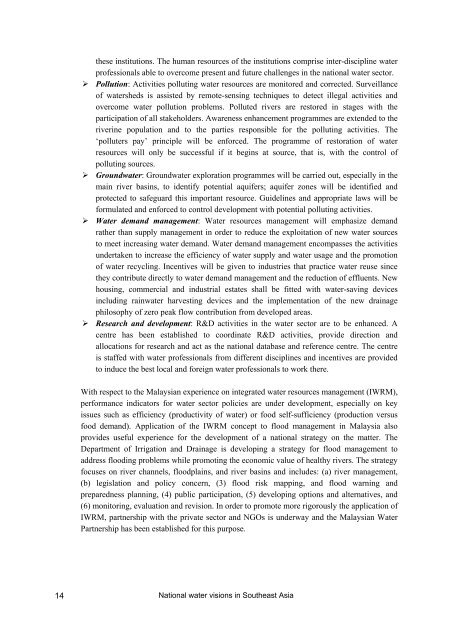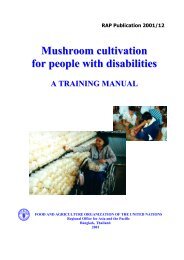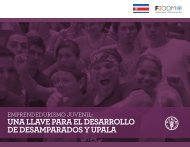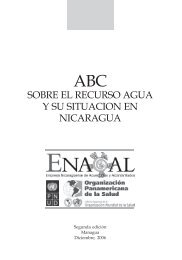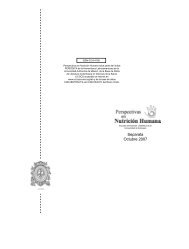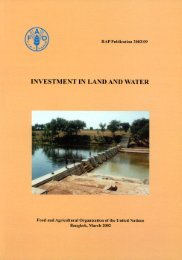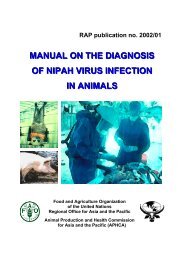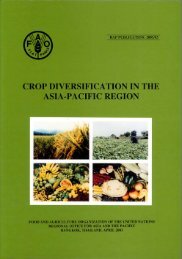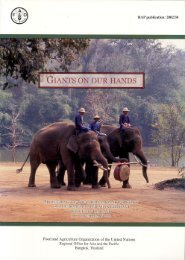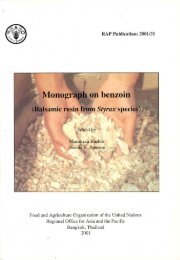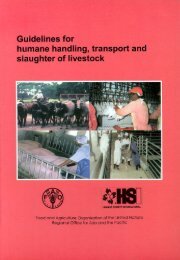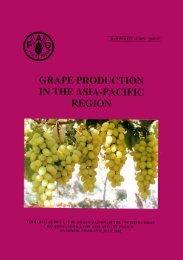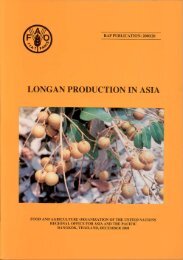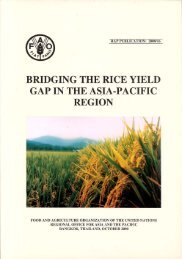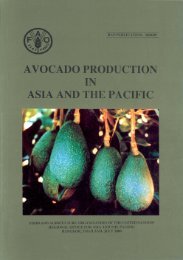The FAO-ESCAP pilot project on national water visions. From vision ...
The FAO-ESCAP pilot project on national water visions. From vision ...
The FAO-ESCAP pilot project on national water visions. From vision ...
You also want an ePaper? Increase the reach of your titles
YUMPU automatically turns print PDFs into web optimized ePapers that Google loves.
these instituti<strong>on</strong>s. <str<strong>on</strong>g>The</str<strong>on</strong>g> human resources of the instituti<strong>on</strong>s comprise inter-discipline <strong>water</strong><br />
professi<strong>on</strong>als able to overcome present and future challenges in the nati<strong>on</strong>al <strong>water</strong> sector.<br />
‣ Polluti<strong>on</strong>: Activities polluting <strong>water</strong> resources are m<strong>on</strong>itored and corrected. Surveillance<br />
of <strong>water</strong>sheds is assisted by remote-sensing techniques to detect illegal activities and<br />
overcome <strong>water</strong> polluti<strong>on</strong> problems. Polluted rivers are restored in stages with the<br />
participati<strong>on</strong> of all stakeholders. Awareness enhancement programmes are extended to the<br />
riverine populati<strong>on</strong> and to the parties resp<strong>on</strong>sible for the polluting activities. <str<strong>on</strong>g>The</str<strong>on</strong>g><br />
‘polluters pay’ principle will be enforced. <str<strong>on</strong>g>The</str<strong>on</strong>g> programme of restorati<strong>on</strong> of <strong>water</strong><br />
resources will <strong>on</strong>ly be successful if it begins at source, that is, with the c<strong>on</strong>trol of<br />
polluting sources.<br />
‣ Ground<strong>water</strong>: Ground<strong>water</strong> explorati<strong>on</strong> programmes will be carried out, especially in the<br />
main river basins, to identify potential aquifers; aquifer z<strong>on</strong>es will be identified and<br />
protected to safeguard this important resource. Guidelines and appropriate laws will be<br />
formulated and enforced to c<strong>on</strong>trol development with potential polluting activities.<br />
‣ Water demand management: Water resources management will emphasize demand<br />
rather than supply management in order to reduce the exploitati<strong>on</strong> of new <strong>water</strong> sources<br />
to meet increasing <strong>water</strong> demand. Water demand management encompasses the activities<br />
undertaken to increase the efficiency of <strong>water</strong> supply and <strong>water</strong> usage and the promoti<strong>on</strong><br />
of <strong>water</strong> recycling. Incentives will be given to industries that practice <strong>water</strong> reuse since<br />
they c<strong>on</strong>tribute directly to <strong>water</strong> demand management and the reducti<strong>on</strong> of effluents. New<br />
housing, commercial and industrial estates shall be fitted with <strong>water</strong>-saving devices<br />
including rain<strong>water</strong> harvesting devices and the implementati<strong>on</strong> of the new drainage<br />
philosophy of zero peak flow c<strong>on</strong>tributi<strong>on</strong> from developed areas.<br />
‣ Research and development: R&D activities in the <strong>water</strong> sector are to be enhanced. A<br />
centre has been established to coordinate R&D activities, provide directi<strong>on</strong> and<br />
allocati<strong>on</strong>s for research and act as the nati<strong>on</strong>al database and reference centre. <str<strong>on</strong>g>The</str<strong>on</strong>g> centre<br />
is staffed with <strong>water</strong> professi<strong>on</strong>als from different disciplines and incentives are provided<br />
to induce the best local and foreign <strong>water</strong> professi<strong>on</strong>als to work there.<br />
With respect to the Malaysian experience <strong>on</strong> integrated <strong>water</strong> resources management (IWRM),<br />
performance indicators for <strong>water</strong> sector policies are under development, especially <strong>on</strong> key<br />
issues such as efficiency (productivity of <strong>water</strong>) or food self-sufficiency (producti<strong>on</strong> versus<br />
food demand). Applicati<strong>on</strong> of the IWRM c<strong>on</strong>cept to flood management in Malaysia also<br />
provides useful experience for the development of a nati<strong>on</strong>al strategy <strong>on</strong> the matter. <str<strong>on</strong>g>The</str<strong>on</strong>g><br />
Department of Irrigati<strong>on</strong> and Drainage is developing a strategy for flood management to<br />
address flooding problems while promoting the ec<strong>on</strong>omic value of healthy rivers. <str<strong>on</strong>g>The</str<strong>on</strong>g> strategy<br />
focuses <strong>on</strong> river channels, floodplains, and river basins and includes: (a) river management,<br />
(b) legislati<strong>on</strong> and policy c<strong>on</strong>cern, (3) flood risk mapping, and flood warning and<br />
preparedness planning, (4) public participati<strong>on</strong>, (5) developing opti<strong>on</strong>s and alternatives, and<br />
(6) m<strong>on</strong>itoring, evaluati<strong>on</strong> and revisi<strong>on</strong>. In order to promote more rigorously the applicati<strong>on</strong> of<br />
IWRM, partnership with the private sector and NGOs is underway and the Malaysian Water<br />
Partnership has been established for this purpose.<br />
14<br />
Nati<strong>on</strong>al <strong>water</strong> visi<strong>on</strong>s in Southeast Asia


